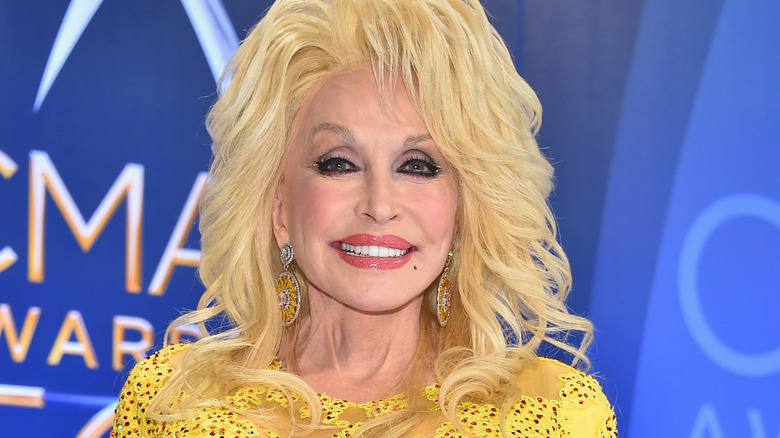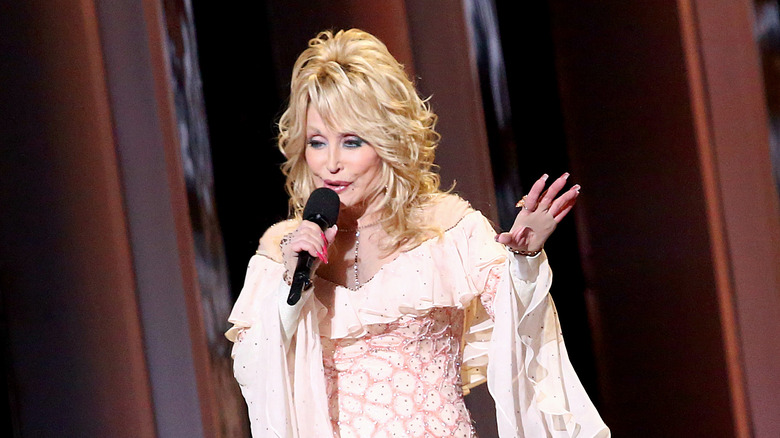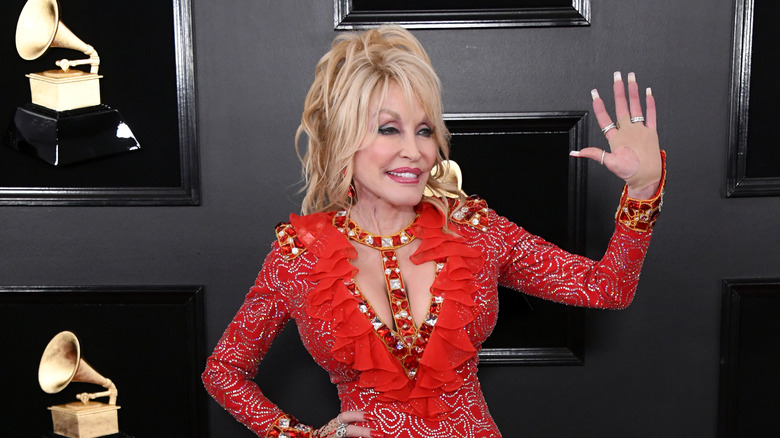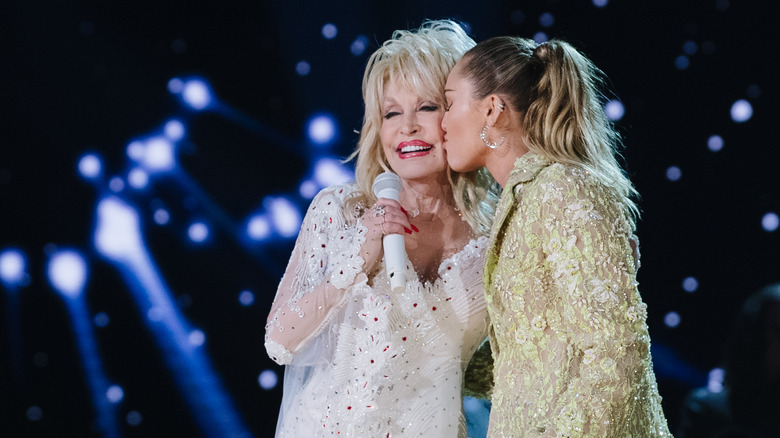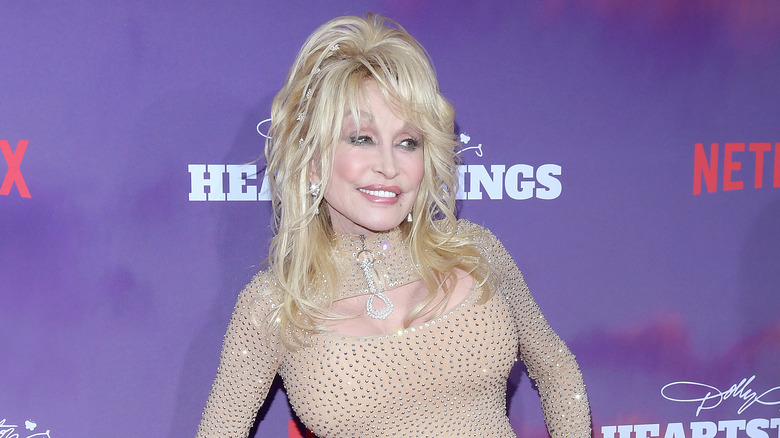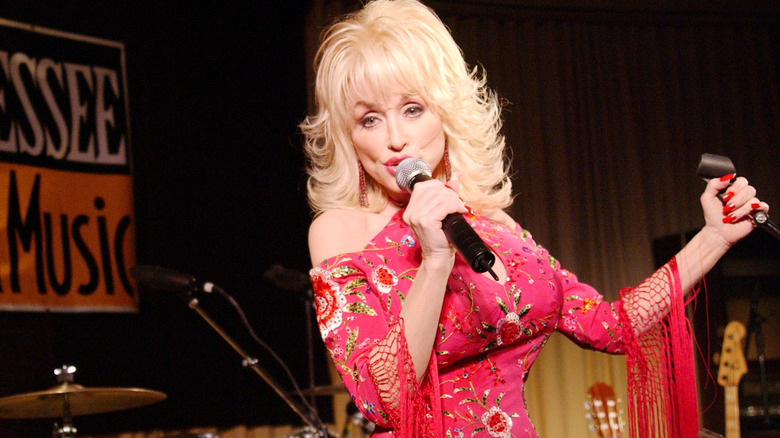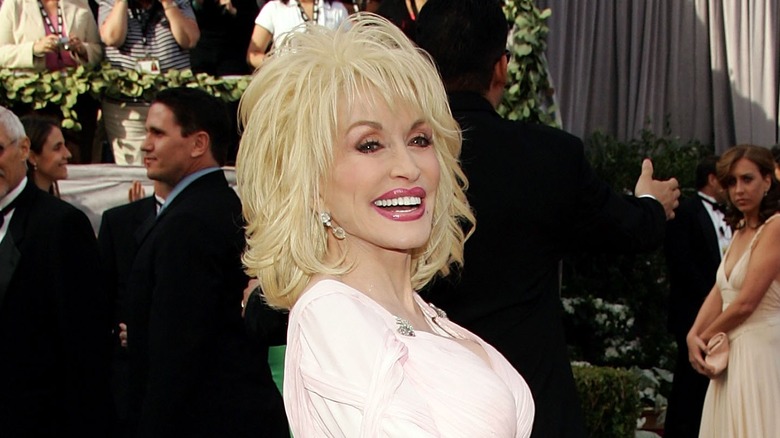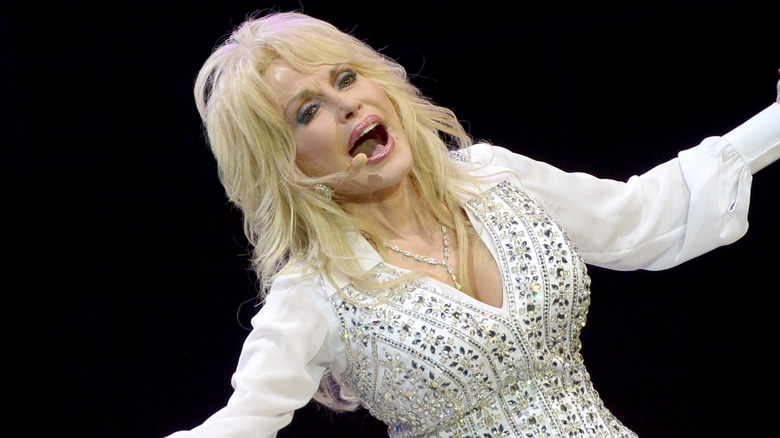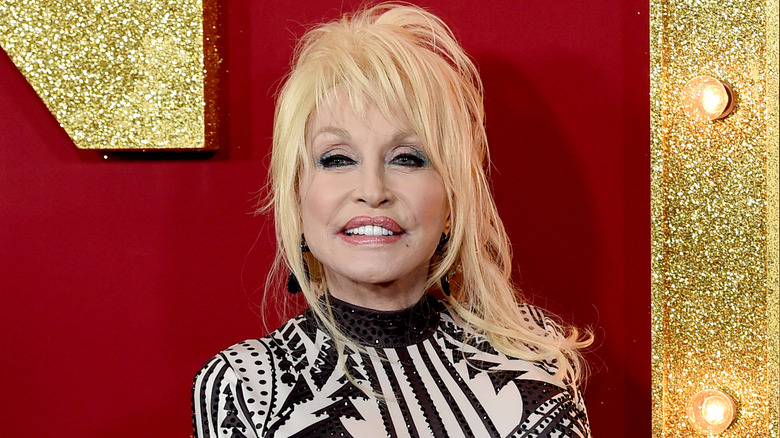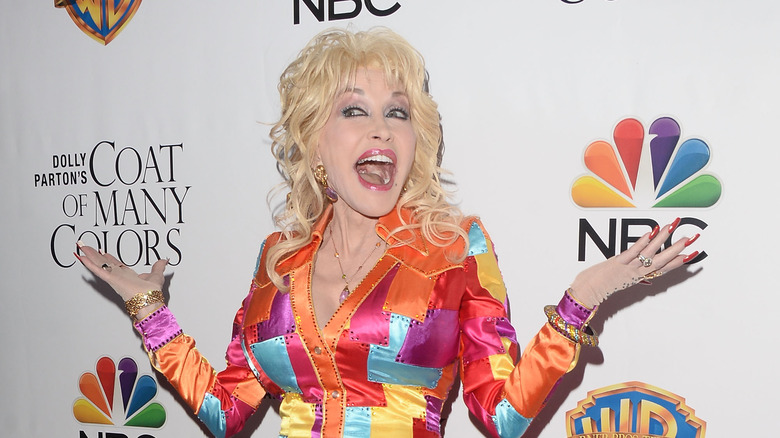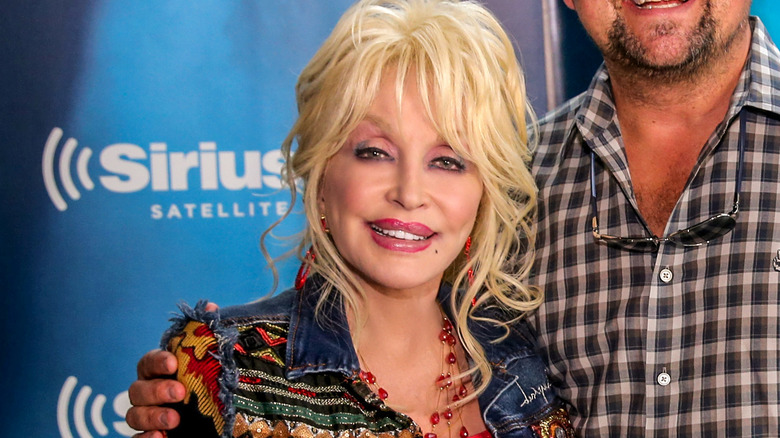How Dolly Parton Changed Country Music And No One Noticed
Dolly Parton is one of the most iconic names in country music. With a career spanning decades, it's hard to list all of the ways that the legendary singer and songwriter has shaped the country music industry. According to The Library of Congress, she released her first single, "Puppy Love," in 1959 at the age of 11. Since then, she has had a massive impact on the country music industry. Her distinctive voice, unique look, and business acumen made her one of the most powerful entertainers of the 20th century, and one who paved the way for future generations.
According to ABC News, Parton's dozens of accolades include multiple Country Music Association awards and Grammys — and even the Grammy's 2011 Lifetime Achievement Award. She has inspired countless other artists over the decades, and she is still influencing country music today. Dolly Parton has changed country music throughout her career, and the world will forever be grateful for her impact.
Dolly Parton helped break the hold men had on the country music industry
When Dolly Parton broke out onto the scene, the industry was dominated by men. While there had been influential female country stars before Parton like Kitty Wells and Patsy Cline, country music was still very much a man's game. Parton's mainstream success came about in the 1960s, an era in which women were demanding to have their voices heard — literally, in Parton's case. "My first single on RCA Records back in the '60s was called 'Just Because I'm a Woman,' and it addressed the issues we are addressing now," she told Sky News in 2019 (via CMT).
Parton didn't just become a legend in an industry comprised mostly of men, but she also did so by bringing stories about women to the forefront. Another early success, "Dumb Blonde" is about a woman thriving on her own after being left by a man. Parton proved that a woman could thrive in a "male" industry. According to Ledger Note, Parton has an estimated net worth of $500 million, making her, as of this writing, the highest-paid country star in the world.
Dolly Parton pioneered the country-pop crossover
Long before Taylor Swift parlayed her country music success into a mainstream pop career, Dolly Parton was pioneering the way for crossover country stars. She was one of the earliest country artists to achieve mainstream success. Most of those who had crossed into the mainstream before Parton, such as Elvis Presley, were men. According to the book Dolly Parton, Gender, and Country Music, Parton was "one of the first established female country stars to take her country pop to the mass market." This led to backlash in Nashville as people protested that one of "their women" was leaving country music, but Parton was undaunted by the criticism.
According to History, Parton cemented her crossover success with the hit song "9 to 5" in 1981, when the song hit No. 1 on the pop charts. Parton turned her crossover music success into a successful acting career as well. According to her IMDb page, Parton has had dozens of acting roles on several TV shows and in many films like 9 to 5, Rhinestone, and Steel Magnolias.
Parton's crossover success notably paved the way for other country stars like Taylor Swift and Parton's own goddaughter, Miley Cyrus.
Dolly Parton has influenced some of the biggest names in the industry
Some of country music's biggest stars claim Dolly Parton as an influence. "Dolly's definitely an influence for me in keeping a sense of humor about very real things — that it's OK to be a solid artist and go for that but keep a light heart about it, too," Deana Carter told CMT. Jennifer Nettles, who is one of many country stars who've suffered tragic real-life losses, also credits Parton with setting an example for female country artists. "I really love, as a woman, that she's kicked the doors open in country," she said.
The list of people who admire Parton is seemingly endless. "You just have the few people that are literally the lighthouses for [country music], and she's one of them," Dierks Bentley told ABC News. Miranda Lambert added, "When you think of a one-woman empire, you think of Dolly. She's a singer-songwriter. She plays instruments."
Carrie Underwood said that she admires Parton's humility. "She doesn't take herself too seriously," she said. "She very much could, because she is this iconic, amazing, talented woman. But she knows how to laugh at herself. ... She just handles everything with grace and humor and a smile, and I feel like she's just the most disarming person in the world."
How Dolly Parton's 9 to 5 became an anthem for equal pay
Dolly Parton has been adamant about not labeling herself a feminist. "I mean, I must be if being a feminist means I'm all for women, yes," she told The Guardian. "But I don't feel I have to march, hold up a sign or label myself. I think the way I have conducted my life and my business and myself speaks for itself. I don't think of it as being feminist... I'm just all for gals."
Parton's music certainly makes that apparent. Her music has a decidedly feminist bent that still empowers and inspires. Her hit 1980 song "9 to 5" became an anthem for equal pay. "It really touched on a really serious subject at the time," Parton told ABC News Breakfast in 2016. "It was based on a company, a group called 9 to 5 and it was about women trying to get equal pay for equal work... it still speaks to what's going on today — we have come a long way as women."
Decades later, there's no shortage of feminist country songs, such as Maddie & Tae's "Girl in a Country Song" and Song Suffragettes' "Time's Up."
Dolly Parton wasn't afraid to rock a different look than earlier female country stars
In a time when women were expected to look and behave like "proper" ladies, Dolly Parton redefined femininity for future generations of country music stars. Parton's big hair and curves became her trademark. Parton has said that she modeled her look off of a prostitute. "I may look fake but I'm real where it counts," she told The Guardian.
Florida State University professor Leigh H. Edwards, author of Dolly Parton, Gender, and Country Music, told Shondaland that Parton's carefully crafted persona is a commentary on women's stereotypes. "Dolly is performing an exaggeration of a couple specific stereotypes," Edwards said. "One image is the innocent mountain girl ... She combines that with what she calls her 'town tramp' image." Edwards added, "By juxtaposing the two of them, she's showing they're both stereotypes and that they're limiting stereotypes."
Parton's look is even inspiring fashion designers in the present day. "I particularly love her outfits from the early days," designer Hannah Weiland told The Guardian. "She had such an individual, strong sense of style that has always stayed true to who she is."
Dolly Parton showed that you didn't have to keep to one genre
Dolly Parton isn't just a pop-country superstar. She's a multi-genre artist who has refused to be pigeonholed into just one type of music. Parton's versatile vocals proved to artists that it's okay to branch out into other types of music. While most of her Grammy Award nominations are for country music, she's also been nominated for pop, bluegrass, sacred, and Christian music. "I've done so many things," Parton told People in 2019 about her decision to dive into Christian music. "And I see that I am in a position to help. People look at me like someone they've always known, like a mother or sister. If I say something good, people might listen."
Parton added that she felt drawn to the genre. "I've just felt like God was calling me into that," she said. "I've always felt like my music was more my ministry than a job. I just feel that this day and time, we need more people that are in a position to help to try to do something, if they can, to brighten the world a little bit. That's what I'm hoping to do now."
Dolly Parton proved that high voices could be popular
Today, Dolly Parton's beautiful soprano voice and her rich vibrato are iconic, but, when she first started out, music executives didn't think that her distinctive voice was well suited for country music. Parton herself has called her voice "a cross between Tiny Tim and a nanny goat" (via Rolling Stone). In The Words and Music of Dolly Parton, Monument Records' Fred Foster said that she was initially rejected by RCA (who later ended up signing her) because they thought she "sounded like a screech owl."
While Monument was impressed with Parton, especially her songwriting prowess, they weren't initially convinced she could make it as a country singer. Parton's first songs were pop songs, but they weren't very successful. But Parton pursued country music, and the rest is history. Not only would Parton standing her ground lay the foundation for the rest of her career, but it also proved to the industry that unique voices could be popular in the mainstream.
Dolly Parton wasn't afraid to fight for her worth
Dolly Parton has been notoriously protective of her catalogue of music. The Library of Congress says she has hundreds of songs copyrighted in her name. According to Wide Open Country, Parton has written over 3,000 songs, but she has been careful about who she lets record her music. The world is familiar with Whitney Houston's cover of Parton's song "I Will Always Love You," but what many don't know is that Elvis Presley wanted to record it, too. Parton recognized her worth and wouldn't be swayed. Parton told CNBC that Presley's manager called her and said, "Now you know Elvis don't record anything unless we get half the publishing."
Parton refused to give over half the rights, even though she had already bragged to her friends that Elvis Presley was recording her song. "So I thought: 'Well, it was just one of those first really hard business decisions I had to make,'" she said.
That business decision paid off. It's estimated that by protecting her rights to the song, Parton made millions in royalties.
Dolly Parton's business model revolutionized the industry
Dolly Parton received her first Grammy nomination in 1969. It was certainly a different era. According to the National Committee on Pay Equity, the average woman earned just 58.9 percent of what the average man earned. In this time of social upheaval, Parton proved that she wasn't just a pretty face and a good performer. She also displayed a keen mind for business.
Parton spent years carefully developing her brand, from her image to her long-term financial success. In 1986, she opened the theme park Dollywood, which, according to its website, remains one of the most-attended theme parks in the world. Entrepreneur Joshua Kennon wrote on his website that Parton's accounting firm and advisors warned her not to open Dollywood, thinking she was a "dumb country girl." Dolly fired them.
Today it's common for country singers to leverage their image and capitalize on their personal brand. According to Rare Country, Miranda Lambert has furthered her stunning transformation as a celeb by opening a boutique called Pink Pistol. Carrie Underwood has a fitness apparel line, and Miley Cyrus runs a nonprofit, Happy Hippies. Clearly, Parton's business ventures proved that female country music stars don't have to limit themselves to just the entertainment industry.
Dolly Parton's example helped other female artists take control of their careers
While Dolly Parton may be reluctant to label herself a feminist (via The Guardian), there's no doubt that she's a feminist icon. She didn't just break down barriers in the industry — she shattered them. The women's liberation movement was in full swing when Parton was coming up in the country music industry, but it was still very much a man's world.
Today, there's no shortage of powerful female country stars who, like Parton, have taken control of their careers. In 2019, Taylor Swift fought back after her back catalogue was purchased from her former label by the reportedly shady celeb Scooter Braun. Swift rallied her fans, accusing Braun and the label's chief executive, Scott Borchetta, of forbidding her from performing her older music. "Neither of these men had a hand in the writing of those songs," she said on social media (via The Cut).
Swift's stance is proof that, while men still have a lot of power, women will speak up. While Parton certainly wasn't the only woman to set that example, she did help pave the way for other female artists to feel empowered.
